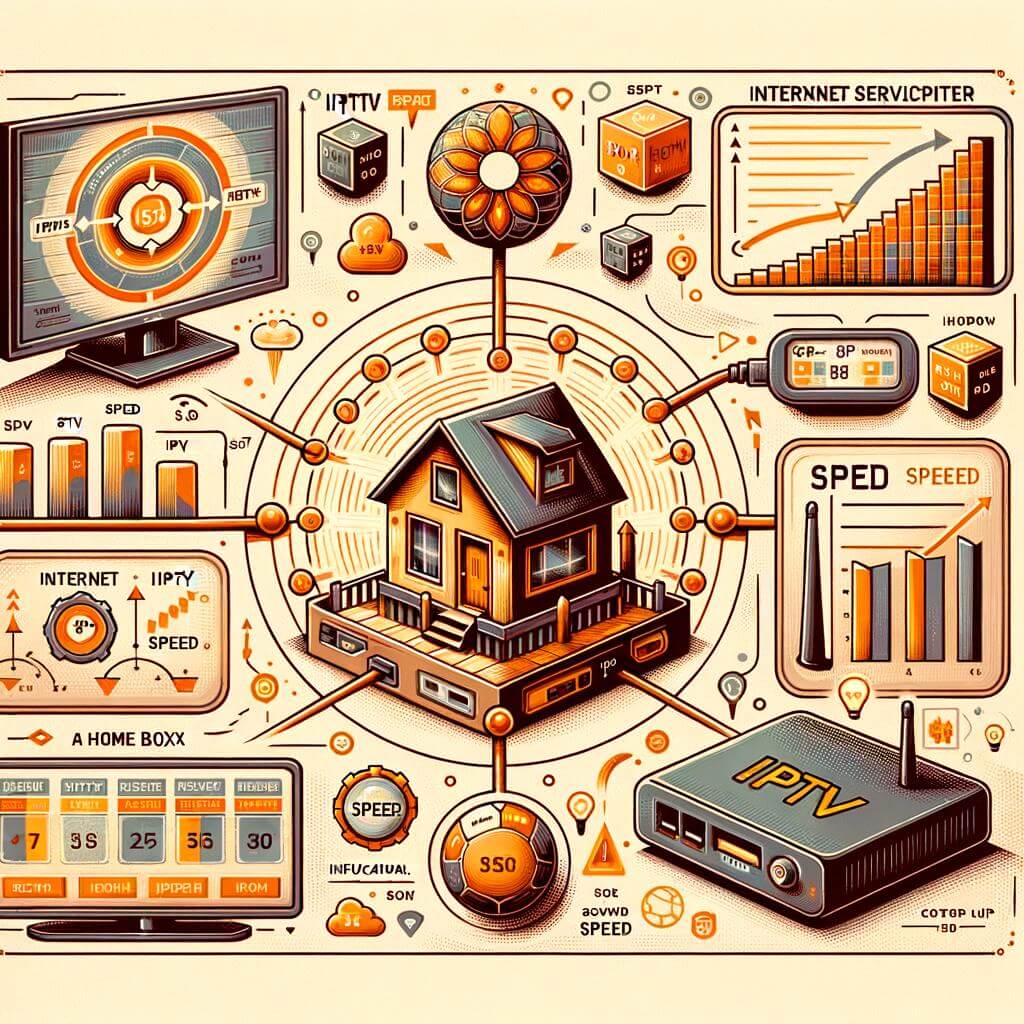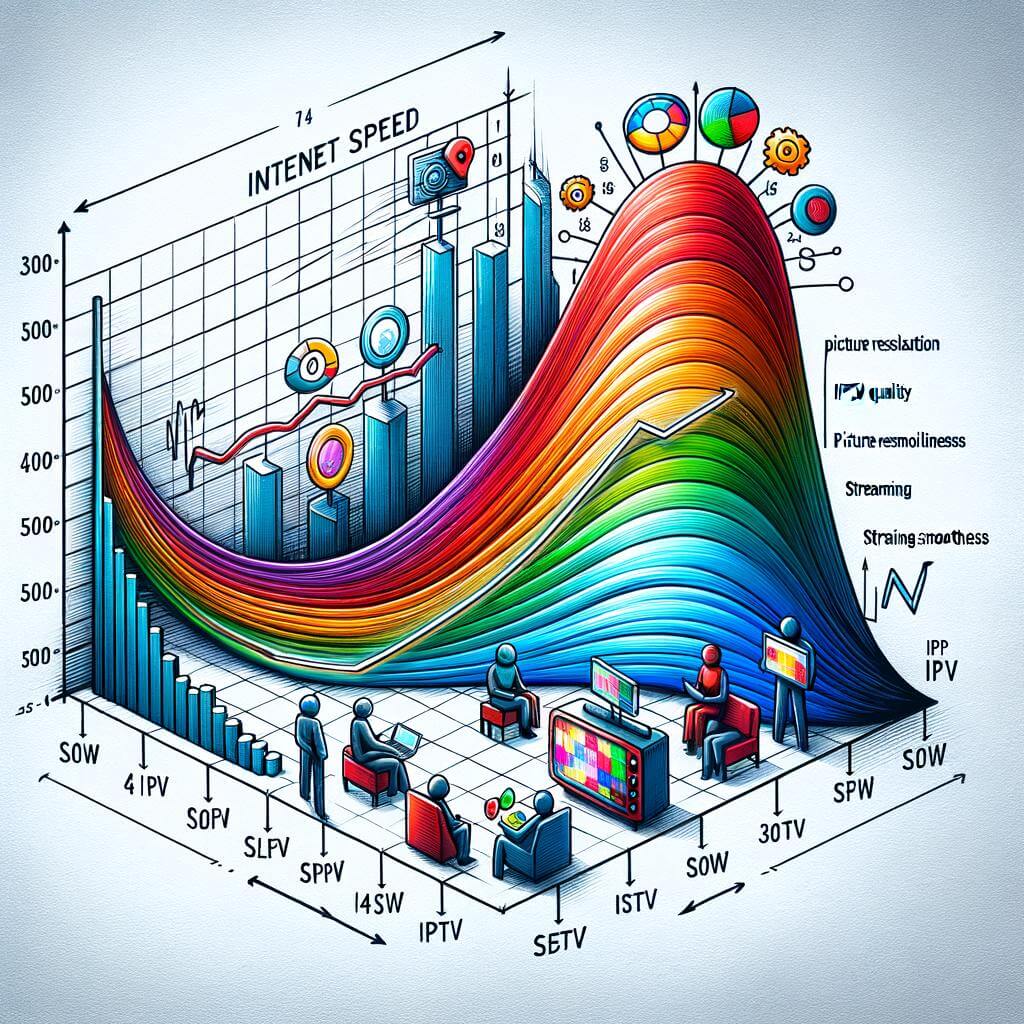
In today’s golden age of technology, how we consume media has dramatically transformed, largely due to inventions like IPTV (Internet Protocol Television). This unique technology has allowed us to watch television via the internet, ushering in an era of unparalleled convenience and flexibility. Unfortunately, many are unaware of the important relationship between IPTV and Internet speed, leading to disappointing viewing experiences. Whether you’re considering upgrading your current IPTV service, or looking to venture into this space for the first time, understanding the impact of Internet speed on your IPTV experience is crucial. In this article, we’ll expertly guide you through all the need-to-know details, ensuring you can make the most out of your IPTV service. You deserve a smooth, uninterrupted viewing experience, and knowing the ins and outs of IPTV and Internet speed is just the ticket!
Table of Contents
- Understanding the Relationship Between IPTV and Internet Speed
- The Significance of High-Speed Internet in Enhancing your IPTV Experience
- Addressing Common Issues with IPTV and Internet Speed
- Expert Recommendations on Getting the Best IPTV Performance from Your Internet
- Q&A
- Closing Remarks
Understanding the Relationship Between IPTV and Internet Speed

IPTV, otherwise known as Internet Protocol Television, delivers audio-visual material using the same technology that drives the internet. This digital media service offers television programming through your standard broadband connection, hence, the rate at which your internet operates directly impacts the quality of your IPTV experience. While traditional TV content is delivered through different signals, IPTV uses packet switching technology to broadcast multimedia directly to your device. This technology relies heavily on internet speed.
Typically, the minimum required speed to enjoy a smooth streaming experience is 5Mbps for SD channels and 8Mbps for HD channels. However, if multiple devices are connected to the internet simultaneously, you might need a more powerful bandwidth. Furthermore, the speed can also dictate the number of channels and quality of content your IPTV service can provide.
- Internet Speed of 15Mbps: This should support HD streaming, even on multiple devices.
- Internet Speed 50-100 Mbps: This offers superb quality for IPTV services, with swift load times and minimal buffering.
- Internet Speed above 100 Mbps: This allows you to watch ultra-high-definition (UHD) content, even on multiple devices simultaneously.
These specific speeds are key factors that determine how IPTV functions and contributes considerably to the efficiency of the service.
| Internet Speed | Content Quality |
|---|---|
| 5 Mbps | SD Channels |
| 8 Mbps | HD Channels |
| 15+ Mbps | HD Channels (Multiple Devices) |
| 50-100 Mbps | Very High IPTV Quality |
| 100+ Mbps | UHD Content (Multiple Devices) |
In conclusion, to have an optimal IPTV streaming experience, invest in a robust internet connection. Remember, your IPTV and internet speed are virtually joined at the hip – so choose wisely!
The Significance of High-Speed Internet in Enhancing your IPTV Experience

Smooth and uninterrupted IPTV streaming largely depends on the speed and stability of your internet connection. Low internet bandwidth often leads to buffering, lagging, and poor video quality, compromising your IPTV experience. To get the most out of your IPTV service, a high-speed internet connection is a must.
The rule of thumb is, the higher the video quality, the faster the internet speed required. For example:
| Video quality | Internet speed |
|---|---|
| Standard Definition (SD) | 2-3 Mbps |
| High Definition (HD) | 5-8 Mbps |
| Full High Definition (Full HD) | 10-15 Mbps |
| 4K Ultra HD | 25+ Mbps |
Besides video quality, other factors may increase the internet speed requirements for an optimal IPTV experience. These include:
- Number of devices: The more devices connected to your network, the higher the bandwidth requirement.
- Type of content: Live streaming and Video on Demand (VOD) require more bandwidth because of their real-time nature.
- VPN usage: VPNs can slow down your internet speed, so you might need higher bandwidth to compensate.
Conclusively, investing in high-speed internet isn’t an extravagance, but a necessity for IPTV users. It not only eliminates frequent buffering and lagging issues but also enhances your streaming quality, bringing a seamless TV watching experience right at your comfort zone.
Addressing Common Issues with IPTV and Internet Speed

Operating an Internet Protocol Television (IPTV) setup relies heavily on the speed and stability of your internet connection. Having a blazing fast internet speed can make all the difference in seamlessly enjoying your favorite TV shows on your IPTV. Here’s uncovering some common issues with IPTV and Internet speed along with ways to overcome them.
Firstly, buffering issues are by far the most common problems users face while using IPTV services. Buffering, also known as lag or stuttering, occurs when your IPTV service needs to pause the playback for a moment to load the next portion of the video. This can prove to be extremely irritating for viewers. To tackle this, ensure you have a stable internet connection with high-speed bandwidth. Cutting down on other internet activities during the IPTV streaming can also provide substantial benefit.
Secondly, poor video quality, including pixelation and disjointed frames, is another common issue with IPTV. This usually stems from a low internet speed as the stream does not have sufficient bandwidth to offer a high-quality video. Upgrading your internet plan for higher bandwidth or opting for a wired internet connection over Wi-Fi can help in resolving this issue.
| Issue | Possible Fix |
| Buffering | Ensure high-speed, stable internet connection |
| Poor video quality | Upgrade internet plan or choose wired connection |
| Connection losses | Check router settings or contact ISP |
Finally, connection losses or sudden disconnections from the IPTV service often occur due to issues with the router or broadband connection. Checking your router’s settings or contacting your Internet Service Provider (ISP) for troubleshooting could help in overcoming this hurdle.
In conclusion, a consistent high-speed internet connection is the backbone of a smooth IPTV experience. Should you come across any problems related to speed or connectivity, the above measures can help enhance your viewing experience.
Expert Recommendations on Getting the Best IPTV Performance from Your Internet

Streaming IPTV can become frustrating without the right internet connection. But here’s good news. With a bit of information and direct action, you can ensure smooth streaming of your favorite IPTV channels. So, without further ado, dive into our expert recommendations on how to get the best IPTV performance from your internet.
This primarily starts with having a high-speed internet connection. As a rule of thumb, you need at least 5Mbps for HD content and 25 Mbps for 4K streaming. However, these numbers can differ based on other factors like the number of devices you have connected at the same time and if there’s any other significant task your network carries out. To be on the safer side, opting for higher bandwidth is always better.
Choosing the Right Modem/Router
Beyond your broadband speed, your streaming quality can get affected by your networking hardware. This includes modems and routers. It is advisable to go with dual-band routers that support both 2.4 GHz and 5 GHz frequencies. It allows you to switch to the less crowded 5 GHz frequency for better IPTV performance.
Here’s a quick guide when choosing routers and modems:
- Support for dual-band i.e., both 2.4 GHz and 5 GHz bandwidths
- Opt for routers that support QoS (Quality of Service). This feature allows you to prioritize traffic for specific applications, like IPTV, thus ensuring better performance
- Ensure that your router supports Ethernet connections, as a wired connection promises better reliability and speed than a wireless connection
Optimum Server Location and ISP Throttling
Giving due consideration to the server location can significantly enhance your IPTV streaming experience. Always opt for IPTV services that provide servers near your location. Further, it’s crucial to tackle ISP throttling
, where your ISP intentionally slows down your internet connection. Using a good VPN service can minimize speed throttling, effectively improving your IPTV streaming speed.
For a clear comparison, here’s a summary table:
| Recommendations | Description |
|---|---|
| High-speed Internet | At least 5 Mbps for HD, 25 Mbps for 4K |
| Router/Modem Specs | Dual-band, Supports QoS, Ethernet Connections |
| Server Location | Choose services with servers near your location |
| ISP Throttling | Use VPN to minimize speed throttling |
Remember, optimizing your network for IPTV streaming is not a herculean task. With these recommendations, you’re only a few steps away from preventing those annoying interruptions and enjoying a smooth, high-quality IPTV experience.
Q&A
Q: What is IPTV?
A: Internet Protocol Television (IPTV) is a system where TV services are delivered through the internet instead of traditional terrestrial, satellite signal, or cable television formats.
Q: How does internet speed affect IPTV?
A: Internet speed is critical for IPTV as it needs a substantial amount of bandwidth to deliver TV signals. The better your internet speed, the higher the video quality and the less buffering you will experience.
Q: What internet speed do I need for IPTV?
A: You need a minimum download speed of between 7-10 Mbps for standard definition (SD) video and 15-25 Mbps for high definition (HD) video. For 4K video, you need at least 25-35 Mbps.
Q: Will improving my internet connection quality improve my IPTV experience?
A: Yes, your IPTV experience heavily relies on your internet connection. A faster, more reliable connection would help in reducing buffering, enhancing video quality, and providing a smoother viewing experience.
Q: Can multiple devices connected to the internet affect IPTV service quality?
A: Yes. The more devices connected to the internet at the same time, the more bandwidth gets divided. This could affect the buffering and quality of your IPTV.
Q: What can I do if my internet speed is not fast enough for IPTV?
A: You could upgrade your internet plan to a higher speed. If changing the plan is not an option, then plug your device directly into your router using an Ethernet cable to maximize the speed.
Q: Will IPTV work with slow speed connections?
A: Yes, but it could lead to a lower quality service with more buffering incidents. For the best IPTV experience, a high-speed internet connection is recommended.
Q: Are there IPTV services with adaptational capabilities for different internet speeds?
A: Yes, some IPTV services can adapt to a variety of internet speeds, adjusting the quality of the stream based on the speed of your connection. However, the experience might not be as good with slower connections.
Q: Why should I choose IPTV over traditional cable or satellite TV?
A: IPTV provides unique advantages such as video-on-demand, the ability to rewind or pause live TV, greater interactivity, and often a wider range of channels. In most cases, it can also be more cost-effective. However, it does need a good internet connection.
Q: How do I find out my current internet speed?
A: You can use an online speed test to measure your current download and upload speeds. Many ISPs also provide speed tests on their websites. If your speed is below what you’re paying for, consider contacting your ISP.
Closing Remarks
In conclusion, understanding how IPTV works and the role Internet speed plays in its functioning can help optimize your viewing experience. Don’t let buffering or low-quality streams dampen your entertainment spirit. Invest in high-speed Internet and savor the benefits of IPTV to the fullest. Stay ahead of the curve by equipping yourself with knowledge about technology. By taking control of your Internet speed, you won’t just enjoy seamless IPTV service but will also substantially enhance your overall online experience. The golden era of digital entertainment waits for no one; step into the future today by ensuring your Internet speed meets the needs of IPTV.
